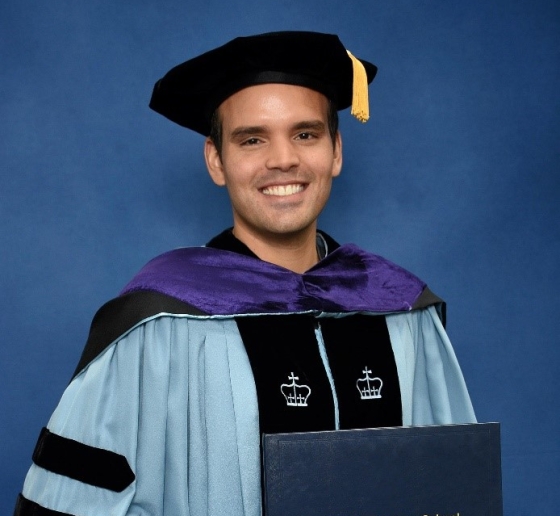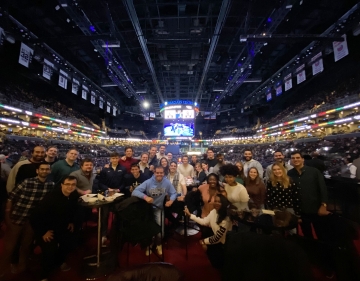Meet Lucas Brandão Borges Caiado ’20 LL.M.
The alumnus talks about his Columbia Law experiences and current career path.

Tell us about your background.
I am from Goiânia, Brazil. I got my first law degree from the University of São Paulo in 2015 and then a Master of Law degree from the University of Cambridge. Before coming to Columbia, I worked as an attorney in matters involving government contracts, competitive bidding, and regulatory issues. I also taught administrative and constitutional law as an adjunct professor.
While LL.M. students are on campus, they can participate in a range of extracurriculars, including over 80 student organizations. Can you talk about your experiences as a member of the Graduation Committee and the Student Senate?
The Graduation Committee is part of the Student Senate, the student body’s liaison to the Law School faculty and administration; LL.M.s have 12 representatives, elected by popular vote at the beginning of the year. The senate plays a vital role in student life and activities, mainly because it is responsible for funding and allocating resources to all student organizations. Being part of Student Senate is also a unique opportunity to participate in important decisions regarding daily life at Columbia Law School and to get to know more J.D.s and the administrative body.
The senate has specialized groups you can join. The Graduation Committee is responsible for organizing most of the graduation-related events and activities. During the year, we planned various activities, ranging from managing graduation social media profiles and producing class swag to renting a private suite for NBA games, organizing a cruise on the Hudson River, preparing the Graduation Ball and, of course, taking part in the graduation ceremony itself. Given the fact that we actively interact with graduating students through these events, the members end up having a special role throughout the year.

Traditionally the committee has both J.D.s and LL.M.s, but only J.D.s are picked as co-chairs. My year, we changed the rule, and I apparently became the first LL.M. to be a graduation co-chair! To be honest, I had no idea of the amount of work and dedication I would have to put into it when I signed up for the job, but I loved being part of it, and I am super proud of all we accomplished. Hopefully, the decision to have an LL.M. co-chair will last, and the next classes will be able to have their representative as well.
During their time on campus, LL.M. students take courses to expand their skill set and knowledge of their legal specialty. Tell us what you have done since completing the LL.M. degree.
The last months before graduation were not easy on the Class of 2020, as the world was hit by the COVID-19 pandemic and at that time, New York was one of the epicenters. Many colleagues who were trying to find positions for OPT [or Optional Practical Training, a non-extendable one-year period for international students to work in the U.S. after graduation] had their interviews canceled and never heard back from the firms; others had their already-secured job offers revoked and returned to their home countries even before graduation.
I consider myself lucky for being able to move to Washington, D.C., where I had family, graduate, and work during my OPT as an international lawyer at Steptoe, where I challenged myself in some areas of law completely new to me. After that, I moved to South Korea to work as a lawyer at the Green Climate Fund—the U.N.’s financial mechanism to assist developing countries in adaptation and mitigation practices to counter climate change—which was a wonderful experience and allowed me to develop even deeper friendships with some of my Korean LL.M. colleagues.
Working at GCF was completely new and very inspiring. At the same time, the legal market in the U.S. was booming again, and I was tempted to accept an offer to work at a law firm in New York—which was the original plan when I first decided to go Columbia. But in the end, after four years of living abroad and having experiences that not long before I could only dream of, I decided to come back to Brazil and start my own law firm: Caiado Ceccarelli Advogados.
To start a law firm from scratch in a world still recovering from the pandemic, without big clients or famous names behind me, was, to put it in one word, an adventure—but one that, with all its ups and downs, is paying off. We have offices in two cities in Brazil, and, I am proud to say, I was even able to collaborate with international LL.M. colleagues to support their clients in Brazil.
But more than connections and just technical skills, I’m confident to say that my time at Columbia—and everything that came from it—helped me to mature and develop the confidence to follow the path I am now on.
What are the top three things you learned here that would be useful for prospective students?
- There is a different Columbia Law School for each one of us; the possibilities and combinations are endless. And if you think there’s not one, create one! For example, a few colleagues and I founded the Columbia Air & Space Law Association.
- Be proactive in exploring the resources at Columbia. Do you want to take a class outside the Law School that was not initially listed as a cross-registration option? You can make it happen if you put in enough effort.
- Professors, even the most famous ones, can be incredibly open to talk and help you; take advantage of it.